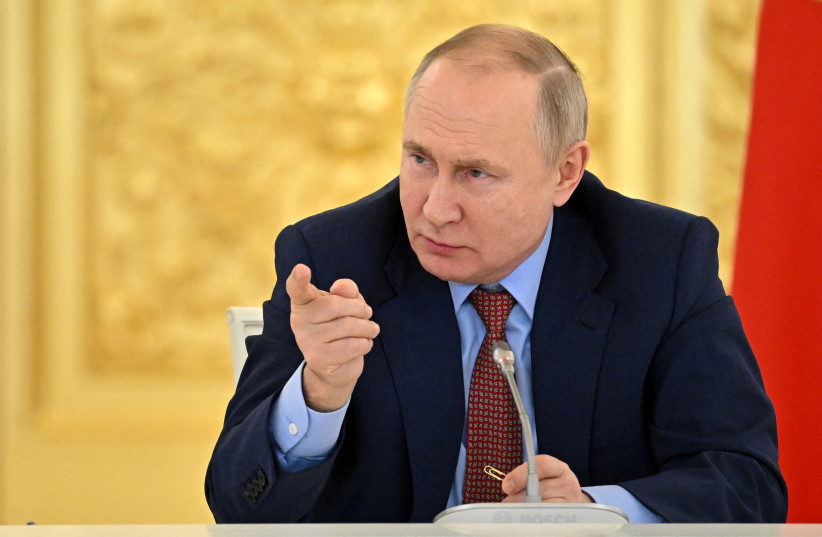The imminent invasion of Ukraine by Russia and the return of the P5+1 to the Iranian nuclear deal, which is all but irrelevant because Iran is a nuclear breakout power now, should be providing some hard lessons to the West about the fecklessness of diplomacy and negotiations with nations who see these tactics as pure weakness.
In a real rebuke to Western diplomacy with Russia, Anne Applebaum, staff writer at The Atlantic and fellow at the SNF Agora Institute at Johns Hopkins University, writes how American and European leaders’ profound lack of imagination has brought the world to the brink of war.
“When talking to the new breed of autocrats, whether in Russia, China, Venezuela or Iran, we are now dealing with something very different: People who aren’t interested in treaties and documents, people who only respect hard power,” Applebaum writes. “What we mean by interests and what they mean by interests are not the same. When they listen to our diplomats, they don’t hear anything that really threatens their position, their power or their personal fortunes.”
Some senior figures do seem to be understanding the results of capitulation and appeasement.
British Defense Secretary Ben Wallace has compared diplomatic efforts by some in the West to prevent a Russian invasion of Ukraine to the appeasement of Nazi Germany ahead of World War II.

“It may be that he [Putin] just switches off his tanks and we all go home, but there is a whiff of Munich in the air from some in the West,” Wallace said.
For over thirty years now, Israeli officials have been caroled and bullied into taking exactly this path with our own local autocrats, who do not respect treaties and documents.
Even from before the Oslo Accords, Israel put its whole diplomatic and political toolkit into the cause of peace through a negotiated solution. It shut down its public diplomacy efforts for many years and put its military strategy to defeat its enemies back in the proverbial dusty drawers. It no longer believed in defeating Palestinian violent rejectionism, but rather to negotiate with it, while never truly seeing or seeking its end.
The motto, “If you want to make peace with your enemy, you have to work with your enemy. Then he becomes your partner,” spoken originally by Nelson Mandela, who was at least dealing with a rational enemy who understood their aims had been defeated, was now the working assumption in Israel’s upper echelons.
There was no thought that first the enemy has to be defeated and accept that their ideas and path towards your destruction has to be finally ended before one can talk about peace and negotiations.
The victory and defeat paradigm was the strategy almost always throughout human history, largely because both sides understood the rules of the game and how to win.
Sadly, the West, perhaps giddy in a largely unipolar world where multilateralism and endless meetings, meaningless conventions and inconsequential conferences are the norm, has forgotten how to win. It believes the whole world sees global affairs as it does: All are rational actors who wish to avoid war and military confrontations at all costs.
However, each failure by the West merely emboldens those who have dreamed of former glories, and see opportunity to gain and win.
The retreat from Afghanistan, the occupation of Crimea and Iran’s constant targeting of Western forces or attacking ships in international waters with impunity have changed the rules of the game, but not for the better.
This means that despite some minority voices in the West who are starting to understand that capitulation, appeasement and retreat do not lead to a safer or more secure world, but exactly the opposite, most are still rigidly attached to these failed ideas.
Israel must understand these trends well, because, while we are not Afghanistan or even the Ukraine, the West has shown that it is toothless, and more interested in diplomatic processes and meaningless agreements than actual consequences on the ground and the safety of a nation.
We should continue to work with the West, they are our closest allies and friends, but we should cease adopting their conflict resolution ideas.
While Israel is right to keep out of the Russia-Ukraine conflict, it must not remain disinterested. As well as looking after the welfare of its citizens, it should learn from the geopolitical ramifications that hard power has returned to the global stage and diplomacy does not always work, especially against a recalcitrant party, who sees weakness in its interlocutor.
Israel faces a similar situation in our region as the West does globally. We are by far the military and economically stronger party, yet we display our weakness with a constant rush for ceasefire, compromise and capitulation, while our enemies continue to call for and act towards our destruction from Ramallah to Tehran.
If we truly want our conflict to end for the good of Israelis and Palestinians, we must think, talk and act with hard power, with a victory mentality, and defeat violent rejectionism and those who seek our ultimate destruction. The days of negotiations and compromise can and should come again, but only once the enemy has been defeated.
The writer is a retired IDF commander and CEO of Mivtachi Israel, an organization of former senior IDF officers, and an adviser to the Israel Victory Project.
